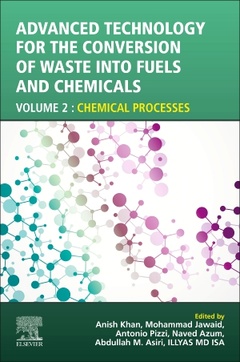Advanced Technology for the Conversion of Waste into Fuels and Chemicals Volume 2: Chemical Processes
Coordonnateurs : Khan Anish, Jawaid Mohammad, Pizzi Antonio, Azum Naved, Asiri Abdullah M., Isa Illyas M.D.

Advanced Technology for the Conversion of Waste into Fuels and Chemicals: Volume 2: Chemical Processes is the second of two volumes by the editors (the first volume is Advanced Technology for the Conversion of Waste into Fuels and Chemicals: Biological Processes). This volume presents advanced techniques and combined techniques used to convert energy to waste, including combustion, gasification, paralysis, anaerobic digestion and fermentation. The title focuses on solid waste conversion to fuel and energy, presenting advances in the design, manufacture and application of conversion technologies. Contributors from physics, chemistry, metallurgy, engineering and manufacturing present a truly trans-disciplinary picture of waste to energy conversion.
Huge volumes of solid waste are produced globally while, at the same time, huge amounts of energy are produced from fossil fuels. Waste to energy (WTE) technologies are developing rapidly, holding out the potential to make clean, sustainable power from waste material. These WTE procedures incorporate various methods and blended approaches, and present an enormous opportunity for clean, sustainable energy.
1. Nanomaterials for the conversion of carbon dioxide into renewable fuels 2. Influence of fuel injection pressure for diesel-waste cooking oil cofuel in a research engine 3. Waste to liquid fuels: potency, progress and challenges 4. Diesel engine performance and emissions with fuels derived from waste tyres 5. Solid oxide fuel cell technology for sustainable development 6. Valorisation of waste tires into fuel and energy 7. Sustainable energy production from food waste: Advanced production strategies and management in the anaerobic digestion process 8. Production of biofuels, bioactive compounds, and fertilizers from fishery waste and wastewater 9. Perspectives and state of the art in producing solar fuels and chemicals from CO2 10. Assessment of the energy recovery potential of waste photovoltaic (PV) modules 11. Advanced vehicle systems and technologies: economic and environmental implications 12. Selective production of light olefins and hydrogen from waste plastics by pyrolysis and in-line transformation 13. Sustainable management of municipal solid waste to fuel: an overview for a better tomorrow 14. Sampling composition for the low heat value evaluation of municipal solid wastes in Brazil 15. Role of polyoxometalates in converting plastic waste into fuel oil 16. Biopolymer-based waste for biomaterials thin film in piezoelectric application
Mohammad Jawaid is Fellow Researcher (Associate Professor) at the Biocomposite Technology Laboratory, Institute of Tropical Forestry and Forest Products (INTROP), Universiti Putra Malaysia, Serdang, Selangor, Malaysia and also Visiting Professor at the Department of Chemical Engineering, College of Engineering, King Saud U
- Presents the latest advances in waste to energy techniques for converting solid waste to valuable fuel and energy
- Brings together contributors from physics, chemistry, metallurgy, engineering and the manufacturing industry
- Includes advanced techniques such as combustion, gasification, paralysis, anaerobic digestion and fermentation
- Goes far beyond municipal waste, including the recouping of valuable energy from a variety of industrial waste materials
Date de parution : 07-2021
Ouvrage de 406 p.
15.2x22.8 cm
Thème d’Advanced Technology for the Conversion of Waste into... :
Mots-clés :
Catalysis; catalytic pyrolysis; waste; biogas; aviation fuel; cellulosic waste; lignocellulose; renewable; textile waste; microbial fuel cell; fuel cell; bioelectrochemical; value-added; liquid fuel; diesel engine performance; Escherichia coli; circular economy; waste valorization; solar fuels; fine chemicals; carbon dioxide; nanomaterials; solid oxide fuel; energetic valorization; tires; sustainability; PV; photovoltaic; pyroelectric; waste management; laboratory waste; industrial waste; municipal waste; chemical processes



